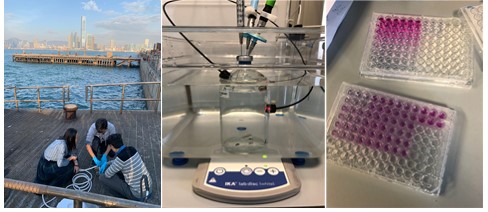 HKU Department of Earth Science
HKU Department of Earth Science
Seminar

Microbial Response to Ocean Deoxygenation
-
Date
February 24,2022
-
Time
10:00AM
-
Speaker
Mr. CHEUNG Lok Shan Department of Earth Sciences, HKU
The oceans are losing oxygen (O2) as the combined result of rising global temperatures and increasing anthropogenic nutrient inputs. With progressive deoxygenation, heterotrophic respiration is increasingly channeled through microbial metabolism, and microbial heterotrophic respiration is thus a key component of models forecasting ocean deoxygenation and its ensuing impacts on marine ecosystems and biogeochemical cycles. Despite its importance to ocean deoxygenation, microbial responses to ocean O2 loss remain underexplored. To create new knowledge on microbial responses to declining O2, and develop predictive rate equations that describe heterotrophic respiration, I determined respiration kinetics in model bacteria, a microeukaryote, and in coastal microbial communities using incubation experiments and ultra-sensitive optical O2 sensors. These experiments revealed that mean apparent half-saturation constants (Km) for O2 uptake in model bacteria Escherichia coli and Reugeria pomeroyi were similar, at 120 ± 16 and 170 ± 61 nM, respectively. Experiment of a model microeukaryote, Saccharomyces cerevisiae, recovered a mean apparent Km value of 190 ± 41 nM O2, which is higher yet compared well with tested bacteria. Km values in coastal microbial communities vary seasonally and with microbial community composition, ranging from 54 ± 37 and 313 ± 258 nM O2. I also explored the effect of dissolved O2 concentrations on the growth kinetics of S. cerevisiae. A suite of incubation-based experiments at a range of low O2 concentrations demonstrated aerobic growth of S. cerevisiae at a concentration as low as 0.20 µM O2 with a half-saturation constant (Ks) of 4.1 µM O2 with respect to growth. Incubations of pure cultures and coastal communities reflect a general idea on how individual species influence microbial community respiration in O2-limiting environments. Kinetics parameters yielded can be employed in models of O2 cycling in Hong Kong waters and extensible to forecasting global ocean deoxygenation. Experiments on microeukaryotic growth confirms microeukaryotic capacity for aerobic metabolisms at O2 concentrations relevant to the large expanses of low-O2 seawater in the oceans.
Additional information: Mr. CHEUNG Lok Shan, Henry, hlsc@connect.hku.hk
